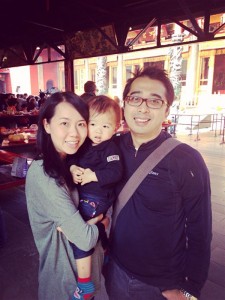 After California, Lam moved to New York and worked for Citicards and then Barclays in London. In 2009, she and her husband returned to Hong Kong because she had landed a job with A.I.G. Finance (Hong Kong). The company was subsequently acquired by the China Construction Bank (Asia). Before she left the company, Lam was vice-president, decision science.
After California, Lam moved to New York and worked for Citicards and then Barclays in London. In 2009, she and her husband returned to Hong Kong because she had landed a job with A.I.G. Finance (Hong Kong). The company was subsequently acquired by the China Construction Bank (Asia). Before she left the company, Lam was vice-president, decision science.
During the 11 years she worked in the banking industry, Lam’s job was mainly related to consumer credit and risk management. She used scientific and mathematical analyses to determine interest rates and the amount of credit that should be granted to consumers. Her duty was to optimise the bank’s profits by originating loans that would not be paid back in one go. For instance, consumers may make the minimum payment on their credit cards but they will end up paying more money in the long run.
Lam rarely thought about whether what she was doing was good for society or not. As a banker, her only focus was to make the most money by using resources strategically and effectively. “To be honest, I didn’t really care about the nature of my job. Instead I was quite proud of it because it could give me prestige and a high income,” she says.
Climbing the corporate ladder in such a competitive industry was by no means an easy thing to do. Lam says getting promoted at work required not just knowledge and hard work but also a good grasp of corporate survival skills, for instance, speaking the right words at the right time and presenting your work in the most positive light in front of the boss. Lam had the package that propelled her into a senior position.
Sometimes, the need to always be on top of things and look presentable was tiring and she often compared herself to others. “In large banks, everyone thinks he is tomorrow’s CEO so even when you are not [an ambitious person], you will be shaped to become one,” she says.
After more than a decade of constantly striving to get ahead, Lam began to reflect upon the nature of the job in the aftermath of the bankruptcy of Lehman Brothers and the financial crisis of 2008. She realised capitalism was not so much a good system as one that would be hard to change in reality. Although many have come to see banks as greedy and the promotion of materialism as something that is harmful to the world, those who work for the banks and benefit from them rarely reflect on their jobs in this way.

The seeds of doubt were already planted in Lam and becoming a mother a year and a half ago made her ponder the meaning of life even more. She realised that the values she wanted to instill in her son were not the ones she was practising in her own life. Thinking about what her life would be like in 10 years, she figured her work would only devour the time she could spend with her son. Lam began to ask herself whether there were other possibilities in life.






































